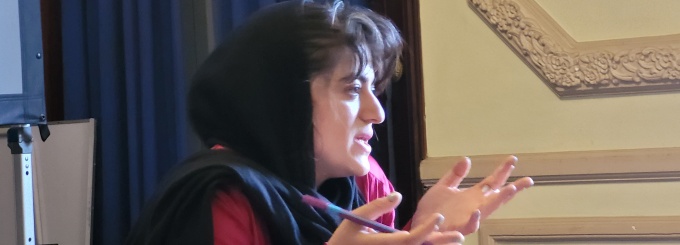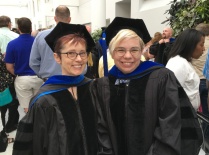Overview

Faegheh Hajhosseini, PhD candidate in Comparative Literature, giving a lecture at the 2024 Critical Concepts Working Group Seminar, Mexico City
The Department of Comparative Literature at the University at Buffalo is a relatively small, yet independent program. It combines a tradition of scholarly rigor with openness to fresh currents in literary studies. Students may pursue either a Master’s Degree in Comparative Literature or a PhD in Comparative Literature at the University at Buffalo. In the past, students have drawn upon a wide variety of comparative knowledges and methodologies including philosophy, psychoanalysis, legal studies, political theory, and anthropology to successfully fulfill program requirements.
Faculty members in the Department of Comparative Literature, similarly, draw upon a range of research interests including nationalism and colonialism, cultural studies, the visual arts (film theory, art history, and architecture) as well as gender studies. Moreover, the department is supplemented not only by affiliated faculty members, but also by a full program of distinguished visiting lecturers as part of the Just Theory Lecture Series.
Because of its small size, the department offers students a very close working relationship with faculty. There are approximately as many faculty members as degree-seeking students. In all cases, students take considerable personal initiative in shaping their program of study. Students will also have the opportunity to partake in the rich student culture in the department including working on Theory@Buffalo and/or organizing the annual graduate student conference.
Contact
For application and other administrative questions please contact: Kevin Vazquez Mende

Student Testimonials
"As a discipline, I believe Comparative Literature sets itself apart in methodology and praxis. Unlike other Humanities departments, Comparative Literature lends itself to a more experimental, cross cultural, and critical approach to knowledge and its production."
-Hunter Capps, PhD Student
"Comparative Literature to me isn't really just about literature. It's about paying attention to the ways in which we read, understand, and engage with the world and with meaning-making."
- Bess Rose, Program Alumna (MA, 2001)
"Comparative Literature offers a unique opportunity within contemporary academic practices to explore texts and ideas across barriers of language, temporality and discipline. While doing this, this program also allows us to reflect more deeply upon the nature of those barriers and how they gain their validation. "
-Rachit Anand, PhD Student
